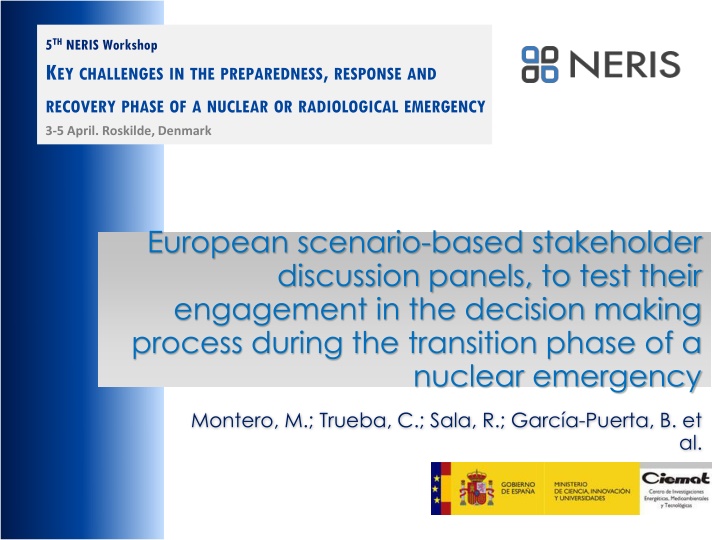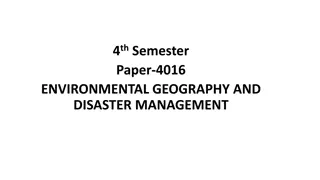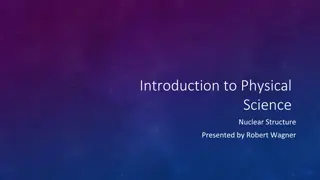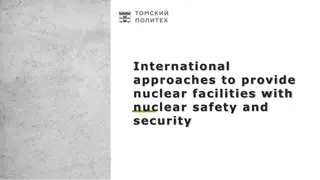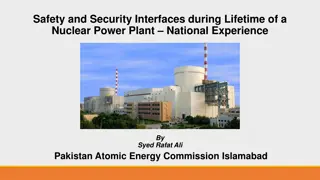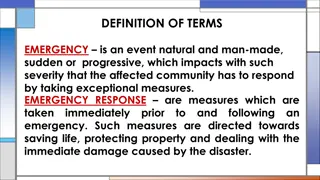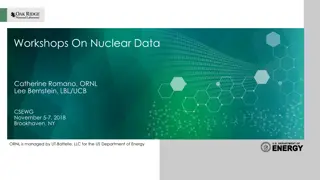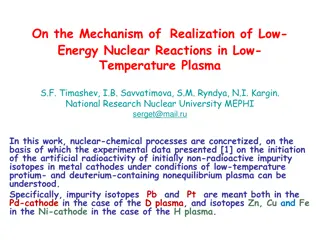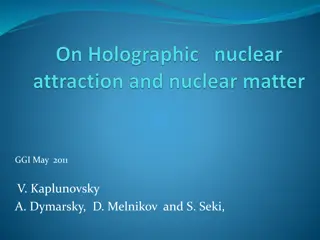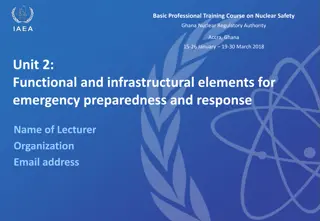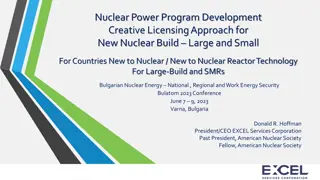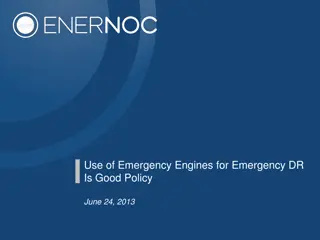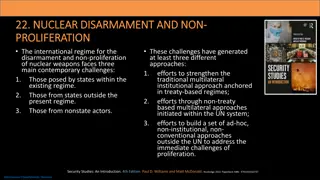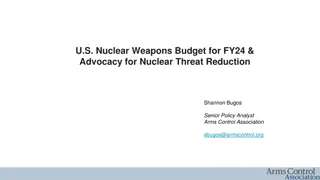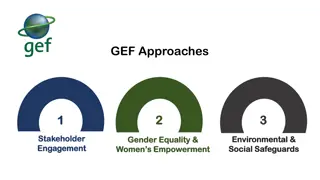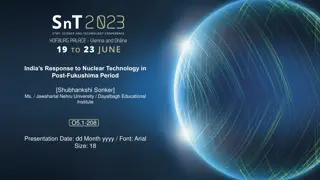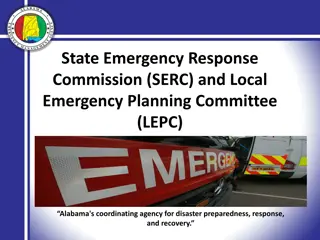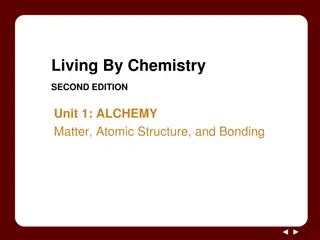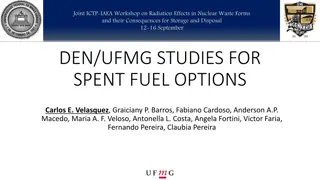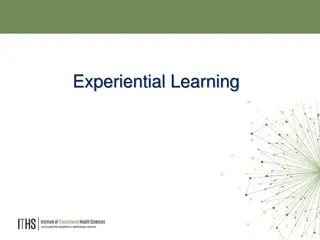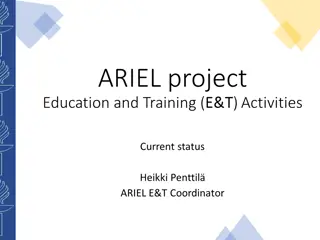Stakeholder Engagement in Nuclear Emergency Response
The 5th NERIS Workshop in Roskilde addressed key challenges in the preparedness, response, and recovery phases of nuclear or radiological emergencies. Stakeholders engaged in scenario-based discussions to test decision-making processes, focusing on transitioning to long-term recovery and reducing uncertainties in managing exposure situations. The workshop included stakeholder participation exercises, stakeholder discussion panels, and Delphi studies to enhance collaboration and decision-making during emergency scenarios.
Download Presentation

Please find below an Image/Link to download the presentation.
The content on the website is provided AS IS for your information and personal use only. It may not be sold, licensed, or shared on other websites without obtaining consent from the author.If you encounter any issues during the download, it is possible that the publisher has removed the file from their server.
You are allowed to download the files provided on this website for personal or commercial use, subject to the condition that they are used lawfully. All files are the property of their respective owners.
The content on the website is provided AS IS for your information and personal use only. It may not be sold, licensed, or shared on other websites without obtaining consent from the author.
E N D
Presentation Transcript
5THNERIS Workshop KEY CHALLENGES IN THE PREPAREDNESS, RESPONSE AND RECOVERY PHASE OF A NUCLEAR OR RADIOLOGICAL EMERGENCY 3-5 April. Roskilde, Denmark European scenario-based stakeholder discussion panels, to test their engagement in the decision making process during the transition phase of a nuclear emergency Montero, M.; Trueba, C.; Sala, R.; Garc a-Puerta, B. et al.
Authors Authors & & Contributors Contributors Montero, M.1; Trueba, C.1; Sala, R.1; Garc a-Puerta, B.1; Abelshausen, B.8; Bohunova, J.9; Capucho, M.11; Charron, S.5; Cro ail, P.2; Durand, V.5; Duranova, T.9; Hilliard, C.3; Madruga, M.J.11; Maitre, M.2; Mitrakos, D.4; Monteiro Gil, O.11; Nunes, P.10; Oliveira, J.10; Paiva, I.11; Portugal, L.10; Schneider, T.2; Skuterud, L.6; Smith, V.3; Tafili, V.4; Turcanu, C.8; Twenh fel, C.7; Van Asselt, E.12; Vaz, P.11 1 CIEMAT Centro de Investigaciones Energ ticas, Medioambientales y Tecnol gicas, Madrid, Spain. 2CEPN Centre d tude sur l Evaluation de la Protection dans le domaine Nucl aire, Fontenay-Aux-Roses, France. 3 EPA Environmental Protection Agency, Dublin, Ireland. 4 EEAE Greek Atomic Energy Commission, Athens, Greece. 5 IRSN Institut de Radioprotection et de S ret Nucl aire, Fontenay-Aux-Roses, France. 6 DSA Norwegian Radiation and Nuclear Safety Authority, ster s, Norway. 7 RIVM Rijksinstituut voor Volksgezondheid en Milieu, Bilthoven, The Netherlands. 8 SCK-CEN Belgian Nuclear Research Centre, Mol, Belgium. 9VUJE VUJE a.s, Trnava, Slovak Republic. 10APA Ag ncia Portuguesa do Ambiente, Amadora, Portugal. 11IST-C2TN Instituto Superior T cnico, Centro de Ci ncias e Tecnologias Nucleares, Lisbon, Portugal. 12RIKILT Institute of Food Safety, Wageningen University & Research, Wageningen, The Netherlands. 5th NERIS Workshop 2 3-5 April 2019. Roskilde, Denmark
Introduction Introduction CONFIDENCE- WP4: Transition to long term recovery, involving stakeholders in decision making processes Improve the preparedness and response during the transition phase, identifying and trying to reduce the uncertainties in the subsequent management of the long-term exposure situation. Structured collaboration involving stakeholders in a sequential process with 3 tasks: 1. Recovery scenarios planning: establishment and optimization of remediation strategies in generic scenarios 2. Scenario based stakeholder engagement: in decisions to recover acceptable living conditions 3. Guidelines and recommendations: to address the planning and decision making during the transition phase Source: IAEA GSG-11. Arrangements for the Termination of a Nuclear or Radiological Emergency (2018) 5th NERIS Workshop 3 3-5 April 2019. Roskilde, Denmark
Scenario based stakeholder engagement A stakeholder participation exercise has been designed in decision-making processes, based on a generic action scenario with the following phases: Scenario analysis: to establish a generic contaminated scenario to define the decision context for discussions, in which each national stakeholder panel, according to their specific needs, can adapt it. An initial questionnaire was launched among experts and interested parties to assist in this purpose. Stakeholder discussion panels: organised to test and evaluate the national dialogue process with stakeholders during the transition to recovery. The discussions will focus on what to do and how to proceed in a contaminated scenario and assess the potential impact of their decisions. Delphi study: a series of three structured surveys are being carried out in parallel with the panels. The objective is to select and prioritise the most relevant preferences and criteria of the different panels to be used by decision-making tools. 5th NERIS Workshop 4 3-5 April 2019. Roskilde, Denmark
Methodology used in the panels General approach A document was prepared to guide the organisation and discussions of the national panels [1]. The general approach to engage the stakeholders in the national panels has been as follows: A question-driven table top exercise to be conducted individually by each participating country (national panel). Simulating an intervention scenario from an accidental release in a Nuclear Power Plant (NPP), based in the contamination pattern monitored after the source term has been controlled and all the contamination has been deposited. Focussed in the consequence management and the post-emergency preparedness for the long term recovery to carry on during the transition phase. One or two sessions per panel were foreseen. 1. Technical Document CONFIDENCE-WP4/T4.2.1-R01 v1.0 Final, CIEMAT, Madrid, Spain. Montero, M; Trueba, C.; Sala, R. (2018). Scenario-based Stakeholders Engagement. Guidelines for national discussions. (HORIZON 2020 EJP-CONCERT, EC GA 662287). Internal 5th NERIS Workshop 5 3-5 April 2019. Roskilde, Denmark
Methodology - Scenarios Scenarios are narrative descriptions of potential futures that focus attention on relationships between events and decisions that have to be taken. They have been characterized from a point of view radiological, socio- economic and environmental and their evolution in the space and along the time The majority of scenarios have explored: the different recovery alternatives taking into account the potential importance of each element described above an estimation and measure of the consequences of the implementation of such planned strategies an approach to assess the practicability and optimisation of the strategies assuring the sustainability of the recovery and rehabilitation in terms of social, economic, political, environmental and/or ethical factors the uncertainties that arise during the transition phase, associated to the preparedness of the recovery strategies, the decision-making process and the involvement of the stakeholders. 5th NERIS Workshop 6 3-5 April 2019. Roskilde, Denmark
Methodology - List of topics addressed 1. What do the stakeholders (SH) understand by the transition phase 2. Main concerns during the transition phase 3. Topics to be addressed during the transition phase: E.g. Food and water control, Relocation of people and restoration of living conditions, Application of countermeasures; decontamination 4. Objectives and criteria of the restoration plan: a. Which objective do we need to achieve? (Minimise dose levels, minimise impacts in the population, maximise public confidence, minimise economic costs, minimise environmental impacts, etc.) b. Criteria to assess the recovery strategy (costs, time, effectiveness, ) 5. Alternative restoration actions: monitored non-intervention, containment, removal, change of use, ) 5th NERIS Workshop 7 3-5 April 2019. Roskilde, Denmark
Objectives pursued by the panels To understand the transition phase, timeline and challenges in the decision-making process, including the decisions taken in the early phase, To identify critical aspects in the preparedness and response for the recovery during this phase, An approach to dealing with the uncertainties arisen to prepare plans for the subsequent recovery, Explore how and to which degree is the engagement of stakeholders, Contribute to obtain and prioritize the preferences of the stakeholders that could be incorporated in a multi-criteria decision-making analysis (MCDA). 5th NERIS Workshop 8 3-5 April 2019. Roskilde, Denmark
National panels involved in the study Nine national panels has been set with one or two sessions. Most panels dealt with decisions taken in the transition phase: To recover food production in agricultural environments To deal the urban decontamination issues, To manage and protect the public and international consumption/marketing Country France Spain Ireland Greece The Netherlands Norway (1) Belgium Slovakia Portugal 1st session Jun-18 Jun-18 Nov-17 Jul-18 Jun-18 2nd session Oct-18 Feb-19 Oct-18 To cope and minimize the impact of evacuation and relocation and possible reversion. Additionally, some panels, as in France, Ireland and Slovakia have dealt also issues related to the early phase in a emergency . Nov-18 May-18 Dec-18 Dec-18 Mar-19 Apr-19 (1) In grey, previous Panel meetings out of the scope of CONFIDENCE (2) Green: Sessions concluded; Orange: Sessions coming-up next 5th NERIS Workshop 9 3-5 April 2019. Roskilde, Denmark
Composition of the panels The panels have been composed of experts and representatives of stakeholders groups, covering the three broad categories defined as: Stakeholders directly involved in the post-emergency planning and management of the transition phase: representatives of Government institutions, agencies or companies directly involved in the management of the transition phase, NUMBER OF PARTICIPATING ORGANISATIONS Others affected but not involved in such management: representatives of the population, producers, industries, marketers, directly affected, Belgium, 8 Spain, 10 France, 11 Slovakia, 8 Portugal, 10 Greece, 17 Others unaffected but interested: experts with a high level of knowledge related to the subject or activity, but not directly affected by this type of situation Norway, 7 The Netherlands, 13 Ireland, 20 5th NERIS Workshop 10 3-5 April 2019. Roskilde, Denmark
Overview of panels in nuclear countries Overview of panels in nuclear countries Emergency Phases No Country Partners Scenarios Main Objectives /Goal Evacuation/relocation of population and ban/restriction of the consumption and trade Emergency and transition phases Identify and evaluate the uncertainties of concern in the decision-making process during the preparedness phase 1 France IRSN/CEPN To facilitate the engagement of relevant stakeholders to the national post-accident preparedness process, and obtain their contribution in terms of their understanding of the critical aspects and uncertainties that arise during the transition phase (to manage the consequences of the accident and plan the recovery) Contaminated inhabited and agricultural areas 2 Spain CIEMAT Transition Urban and agricultural contaminated scenarios Identifying criteria and issues relevant to establish a recovery strategy and evaluated on the usefulness of the MCDA tool in the decision-making process 6 The Netherlands RIVM/RIKILT Transition phase 7 Belgium SCK.CEN Transition phase Urban contamination Exchange views and experiences related to the scientific and societal uncertainties To facilitate stakeholders involvement and to provide valuable input in the process of decision making to improve preparedness for and response during the transition phase. Contaminated urban scenario 8 Slovakia VUJE Transition phase Icon made by freepick from www.flaticon.com 5th NERIS Workshop 11 3-5 April 2019. Roskilde, Denmark
Overview of panels in non nuclear countries Overview of panels in non nuclear countries Emergency Phases Early and intermediate response phases and transition to recovery. No Country Partners Scenario Main Objective /Goal Contamination of food and animal feedstuffs in the aftermath of a nuclear accident abroad. Contamination in food derived from an accidental release ocurring in a neighbouring country Agricultural scenario contaminated by a significant fallout from an accidente in Russia To identify and address the uncertainties associated with making decisions on food and feed protective actions in the aftermath of a nuclear accident abroad. 3 Ireland EPA Emergency response and transition phase to trigger the active participation of the stakeholders in formulating an effective approach for dealing with the inherent uncertainties of the transition and recovery phases of an emergency. 4 Greece EEAE Transition phase and long-term recovery Priorities and uncertainties related to selection of actions and strategies in the management of food production in transition to long-term recovery. 5 Norway DSA Transition phase and long-term recovery Urban and agricultural contaminated areas 9 Portugal APA/IST Test the decision-making process to select recovery strategies for the scenario 5th NERIS Workshop 12 3-5 April 2019. Roskilde, Denmark
Uncertainties identified Information needed for decision making and planning Geographic, environmental, socio-economic, radiological Type of information support Management and decision making Regarding decisions Moment / time Search for balance between the different evaluation criteria Impact in the long term Consideration of all the interests involved Zoning, identification of the areas / sectors subject to the measures adopted Involvement of local levels in the decision What strategy must be adopted Assumption of the worst case scenario 5th NERIS Workshop 13 3-5 April 2019. Roskilde, Denmark
Management and decision making Regarding governance Communication Social, economic and environmental factors Evolution of the situation Actions and strategies Legal aspects and compensation Acceptance by producers and population Control and surveillance Conservative, political, social, environmental criteria Specific management of the economic sectors affected (farming, national / international market) 5th NERIS Workshop 14 3-5 April 2019. Roskilde, Denmark
Summary and conclusions The nine panels organized in Europe, under the WP4, have allowed to obtain a very broad and complete vision of all issues of interest, and the preferences of stakeholders associated with decision making and the preparation of plans for post-accident recovery, during the transition phase of an emergency. The impact of the measures implemented during the urgent and early phase over the decisions to be taken in the post-emergency, (when and how to review or lift such measures), or how to manage the consequences of contamination during the transition phase and how to select and evaluate the best strategies to consider in future recovery plans, have been discussed. The main uncertainties of the process have been identified and categorized. Urban and agricultural / farming environments have been considered, in nuclear countries, directly affected and in surrounding non-nuclear countries. Qualitative and quantitative assessments (using the MCDA) of preferences and of decision criteria have been conducted. 5th NERIS Workshop 15 3-5 April 2019. Roskilde, Denmark
Next steps - In-depth analysis of uncertainties In the coming weeks, we will go in-depth into the panel conclusions: Cross-country analysis of panel conclusions Categorization of uncertainties Combining with Delphi study conclusions The uncertainties can be categorised regarding their social, economic or environmental consequences / implications in achieving a restoration of the living conditions according the principles of the sustainability (Bardos et al., 2018). The more and better we can consider and assess all these uncertainties when preparing the plans and strategies for the recovery, it will have greater opportunity to adequately incorporate stakeholders preferences and interests. 5th NERIS Workshop 16 3-5 April 2019. Roskilde, Denmark
Acknowledgement This CONFIDENCE project. CONFIDENCE is part of the CONCERT project. This project has received funding from the EURATOM research and training programme 2014- 2018 under grant agreement No 662287. work has been accomplished under the 5th NERIS Workshop 17 3-5 April 2019. Roskilde, Denmark
5THNERIS Workshop KEYCHALLENGESINTHEPREPAREDNESS, RESPONSEANDRECOVERY PHASEOFANUCLEARORRADIOLOGICALEMERGENCY 3-5 April. Roskilde, Denmark European scenario-based stakeholder discussion panels, to test their engagement in the decision making process during the transition phase of a nuclear emergency Thank you for your attention! milagros.montero@ciemat.es
